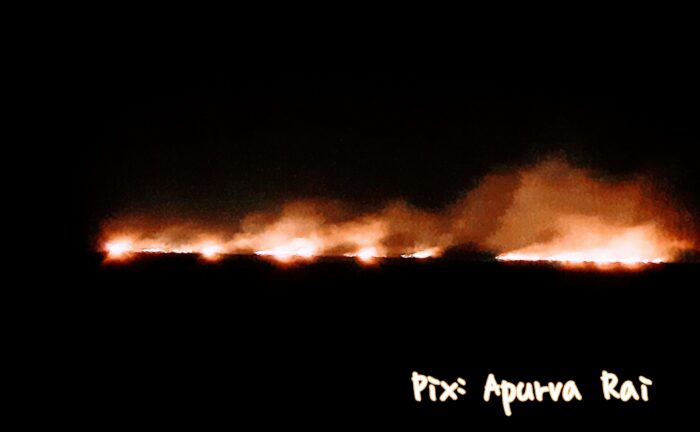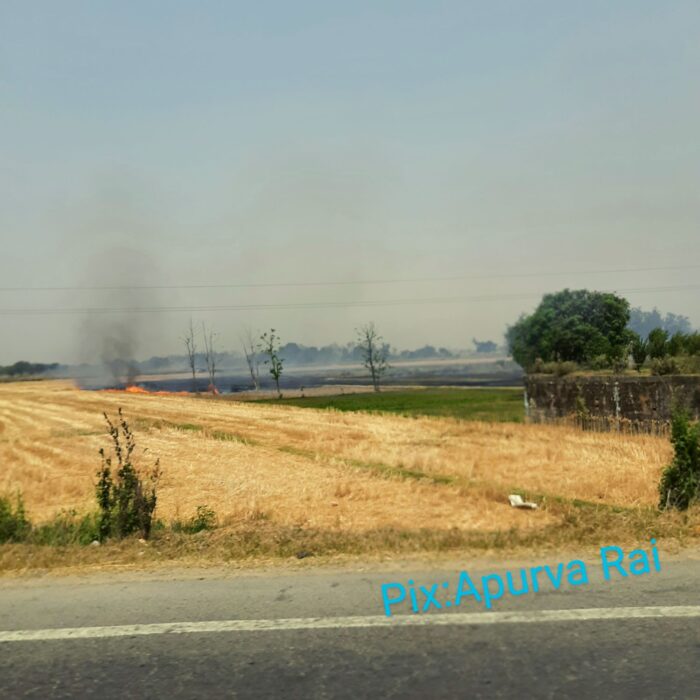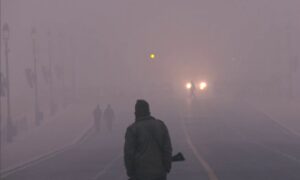
Some time ago, in the month of late February and early March I had the opportunity to travel from New Delhi to Allahabad (now Prayagraj; though I still love to address it by its old name). I preferred to travel by an early morning train, instead of opting for a night journey, simply for the reason that I want to enjoy the wheat crop that adorned the huge fields throughout.
What a mesmerising scene it was! Most of the crop was ripening and it looked like a wide golden harvest. The hard work of the farmers had paid dividends as they proudly moved around the golden fields praying the sun god to keep them blessed for some more time to come. Everyone knew even a little rain would deprive them of the rewards they were waiting for. After about a fortnight I returned home by a night train as my heart was contended and I had that happy feeling within me.
This time, my stay in my home in Noida was not long as I had to come to Sidharth Nagar, a backward and a poor district in eastern Uttar Pradesh. My better half is a professor of mathematics in the Sidharth University Kapilvastu (SUK) in the district. Before I came to this remote area I was happy that there is a god-sent opportunity to breathe some fresh air in the rural ambience that I get here. The pollution level of Delhi and its surrounding areas has been giving tough time to the people living there.
By April end most of the wheat crop had been harvested. It didn’t take much time as the farmers leased huge machines to accomplish the task. It took several hours to get the entire yield which would, otherwise, have taken several days and lots of manpower. The vast golden fields presented a picture of the residue left by the machine as it is not capable of removing the plants from its roots. The residue, called wheat stubs, is a big problem for the farmers because there does not seem to be an easy method to remove them.
While I rejoiced over the high yields I was shocked to see farmers burning the wheat stubs. You drive anywhere you come across black smoke billowing from the fields and surrounding the entire atmosphere. I was dismayed at the condition of villages. So far I thought I would be happy living in the green and clean atmosphere of the villages but it turned out to be worse than what I had been seeing and facing in Delhi for over several decades. The highways passing through the villages became dangerous as thick smoke engulfed the horizon and the visibility turned zero.
It was not a one-day problem. Every morning I woke to inhaling polluted air. I had been going for morning walks earlier but now I stopped. The air was not fresh any more. There was bad odour and minor particles in the air which made me uncomfortable. My eyes too were itching.
Everywhere the agricultural fields were on fire. I am told it is almost in the entire state of Uttar Pradesh. Be it the day or be it night it does not matter. The scene at night is even more frightening. From a distance you can see a red hue over the fields and thick black smoke going up in the sky.

I discussed this with all those I could talk to. My interactions proved one point. Everyone in the society was seeing the wrong taking place except the state government or the authorities. The administration gave ample proof it is in deep slumber and any fire is not enough to wake it up. The entire state of Uttar Pradesh is burning and the authorities do nothing to stop it or find a solution. I thought how is it possible for
the ministers or the top officials of the machinery to go on breathing the polluted air and yet keep silent.
ANY REMEDY
The problem of wheat stub burning is not a small issue. The farmers have found it as an easier method to clean up their fields and leave them for some time before they go for another crop. Burning the stubs is fast and simple. Otherwise, they would have to spend weeks in the fields to remove those stubs from the ground. I thought the root problem is lack of machine which could remove those stubs. If the engineers could make it possible through some innovation we shall, perhaps, be able to prevent fire, I mused.
While talking to some people I came to know that at some places farmers grow onions as an extra crop which gives them some extra earning too. Also, this is the time to grow sunflowers in the fields. If farmers are educated to remove stubs and grow sunflowers instead, perhaps, they will go for it as it offers them some lucrative alternative. After all, it is a question of good earning in between two crops that moulds the entire thought process of farmers.
BAD FOR SOIL
Burning crops offers no solution. The fire spoils the upper crust of soil besides burning several insects including earthworms alive. Small burn particles causes breathing problem for everyone including the farmers living in the area. If taken for health check-ups most of the farmers will report lung problem and bronchitis symptoms. Signs of burn remain in the fields for some time as the farmers do not have
anything to grow. They wait for monsoon to set in and rain washing away the burnt particles.
It is for the government and local administration to prevent the farmers from ‘burning their fields’. It is for the government to push scientists and engineers to find an inexpensive and lucrative alternative which is widely acceptable to the farmers. Though rules which ban burning in open they remain ineffective in the absence of better solution to attract farmers. One thing has become clear for now that mere laws cannot stop malpractices there have to be better education as well as better solutions in hand.
If we do not want to see those golden fields turning black we have to be serious. The seriousness should be such that we see the end results in the fields and do not end up in debates, classroom discussions and tall talks. If farmers are happy the fields will smile and remain green forever.
[the_ad id=”41103″]


















